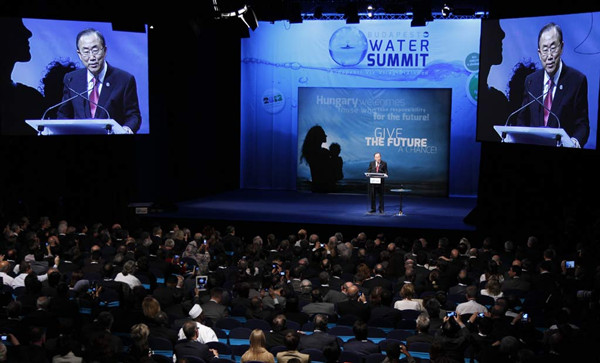UN: Water holds key to sustainable development
 0 Comment(s)
0 Comment(s) Print
Print E-mail China.org.cn, October 9, 2013
E-mail China.org.cn, October 9, 2013
Secretary-General Ban Ki-moon today stressed the vital role of water in sustainable development, highlighting in particular its importance with regard to food security, climate change and sanitation.
"Water holds the key to sustainable development. We need it for health, food security and economic progress," Mr. Ban said in his opening remarks at the Budapest Water Summit. "Yet, each year brings new pressures."
|
Secretary-General Ban Ki-moon (at lectern and on screens) addresses the 2013 Water Summit in Budapest, Hungary. [UN Photo] |
He noted that by 2030, nearly half the global population could be facing water scarcity and demand could outstrip supply by 40 per cent.
"We must address unsustainable use… We must use what we have more equitably and wisely. We cannot expect governments to do this alone. Guaranteeing a water secure world will require the full engagement of all actors, not least the world of business."
Mr. Ban noted that agriculture is by far the largest user of freshwater, and there is growing urgency to reconcile its demands with the needs of domestic and industrial uses, especially energy production.
"Small farmers and industrial giants alike must learn to get more crop per drop," he said. This means improved irrigation technologies, and less water-intensive and more climate-resilient crops.
Climate change, he continued, poses the risk of diminished water supplies in much of the world.
"We must make sure that water remains a catalyst for cooperation not conflict among communities and countries," Mr. Ban said.
The UN stands ready to assist in this area, he added, noting for example the UN Development Programme's (UNDP) Shared Waters Partnership that is supporting political agreement on common resources, such as in the Nile Basin.
He recalled that last month, the Intergovernmental Panel on Climate Change (IPCC) reported that climate change is affecting the global water cycle, noting that ‘extreme precipitation events' will very likely become more intense and more frequent by the end of this century, as global surface temperatures increase.
"In layman's terms, this means more floods," said Mr. Ban. "We will also see more droughts.
That is why we must do everything we can to keep global temperature rise to below 2 degrees Celsius above pre-industrial levels. To do that, we need to finalize a robust legal agreement on climate change in 2015."
He added that water and sanitation feature large in the anti-poverty targets known as the Millennium Development Goals (MDGs), whose deadline is 2015. While the MDG target for providing access to improved water sources has been reached, 780 million people lack this basic necessity.
"Roughly 80 per cent of global wastewater from human settlements or industrial sources is discharged untreated. Water quality in at least parts of most major river systems still fails to meet basic World Health Organization standards. Close to one-third of people drink water that endangers health. Even more people lack adequate sanitation."







Go to Forum >>0 Comment(s)